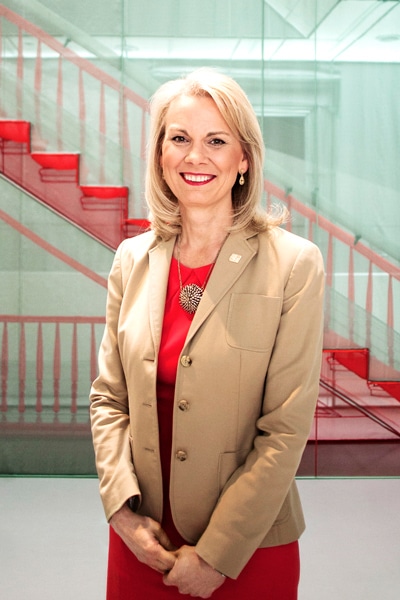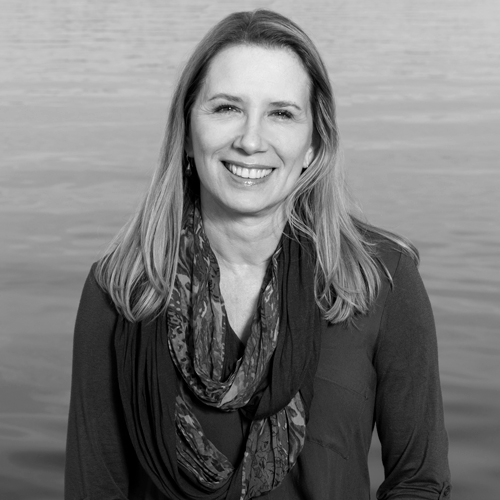
There have been a number of opportunities that Teresa Tanner has nearly walked away from in her career. Initially, she wasn’t interested in going into banking. She couldn’t see herself working in HR or in learning development either, so her first inclination was to say no to all of them. Fortunately, Tanner realized she was making decisions based on preconceived ideas—like that banking doesn’t allow creativity or that HR is a bureaucratic, policing function that gets in the way of doing business and getting things done.
But in each case, something drove her to get more information that ultimately forced her to recognize her own personal biases.
“My career is littered with things I said I would never do but that actually forced me to listen more carefully and acknowledge what I didn’t really understand,” Tanner says. “I could have missed some fabulous opportunities.”
Those lessons led her to become chief administrative officer at Fifth Third Bank in Cincinnati, where she handles corporate reputation, human capital, strategic sourcing, and communications among many other functions. Along the way, she never lost her commitment to considering the most diverse candidates to find the most qualified talent for every job. She also prioritizes ensuring an engaging and empowering environment that fully leverages employees’ abilities.
When Tanner came to Fifth Third more than a decade ago, she says that it did not have a particularly diverse workforce, especially when it came to women in leadership positions. At the time, there was only one woman on the company’s board of directors and none on its Enterprise Committee of top leaders.
To help address the gender gap, Tanner created Women in Leadership—a nine-month class that offers accelerated learning opportunities to up to twelve senior leaders who have been identified as having C-suite potential. Efforts such as this—along with the internal women’s business resource groups, intentional job rotations, and increased public awareness—have added two women to the Enterprise Committee. Women now make up about one-third of Fifth Third’s board of directors, including its chairwoman, Marsha Williams.
“Creating true diversity is a business priority that is critically important to us,” Tanner says. “We won’t be the best bank possible until we have the best representation around the table.”
Part of her strategy has been to prioritize hiring diverse candidates in the first place.
“There is a common argument that diversity hiring is difficult because there is a supply issue. But that’s not true. It’s a demand issue,” Tanner explains. “The way to get better and more diverse outcomes is to demand them. To be the most attractive place for everyone to work, we have to clearly communicate that we welcome and promote diverse candidates.”
Tanner is quick to indicate the importance of having diverse interview panels, as well. She says they help inoculate the process from unconscious bias. They also help access potential resources that may not be available to or known by more homogeneous groups of interviewers.
Tanner has also helped address the attrition rate at the bank for women in the year after they return from maternity leave. That number was double the rate for all women. Fifth Third created a Maternity Concierge program that provides support from pregnancy through the first year after birth. The free program includes assistance with nursery planning, hosting baby showers, finding child care, and nursing strategies after returning to work.
“The first year is critical for women when they decide whether or not to return to their jobs,” Tanner says. “If they decide they want to continue working, we want to make the transition back from maternity leave easier.”
The Maternity Concierge is still in its infancy, so to speak, but more than 250 women have used it in less than a year. In fact, surveys have shown that participants found it to be a tremendously positive service that helped them develop a healthy and productive balance between work and their lives at home with a new baby.
Tanner believes companies should continue to innovate with support programs and benefits to help increase the number of women in leadership roles.
“Creating paths for women to reach top leadership positions is a responsibility all of us share,” she says. “We can and should do more.”
Fifth Third now provides four weeks of 100 percent paid parental leave, including adoptive and foster parents, in addition to the standard six or eight weeks of medical leave. Tanner encourages parents to take advantage of the time even if they have a nonworking partner at home. After all, there is only a short window of time for bonding with a new child.
Tanner has firsthand experience with navigating the twists and turns that come with gender issues in the workplace and the broader society. Her husband retired when their children were young so he could stay home and she could continue her career. The fact that his decision hasn’t been as socially acceptable as she would like indicates the persistence of well-established gender stereotypes.
“There are still too many questions we ask women at work that we don’t ask men—like if they can handle a promotion with small children at home,” Tanner says. “We need to have the hard conversations and take steps that grow out of them to create a work environment where everyone brings their best selves to work and that leverages the best they have to give.”
Photo: William Philpott

